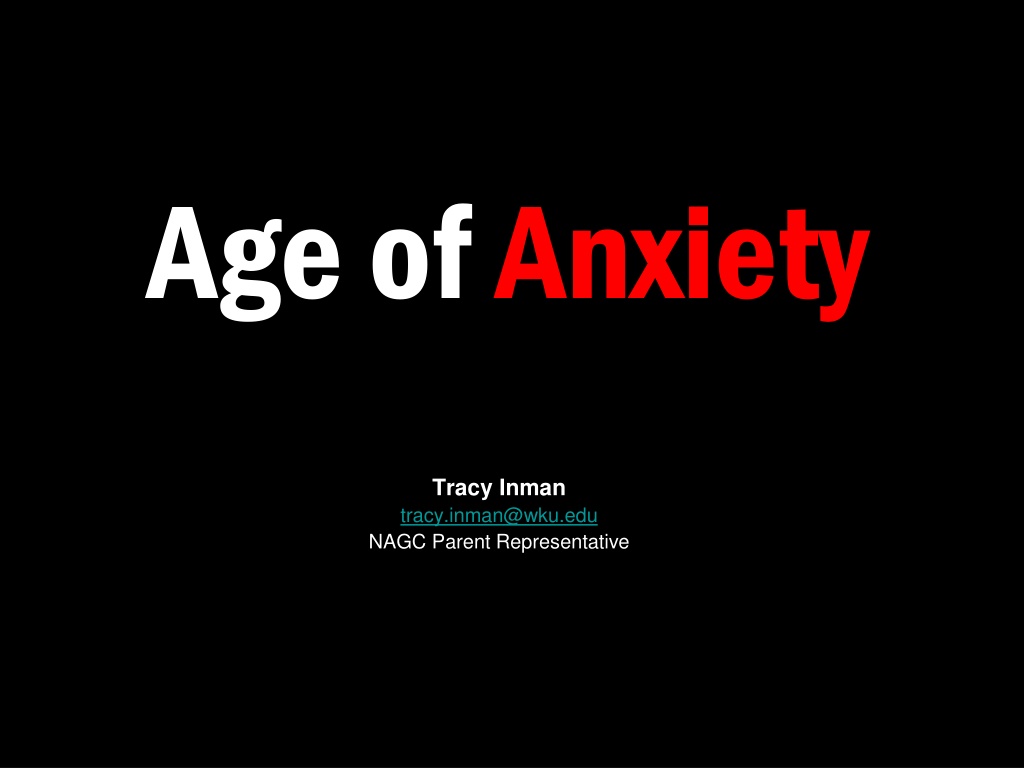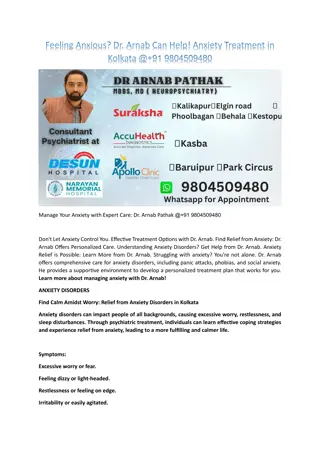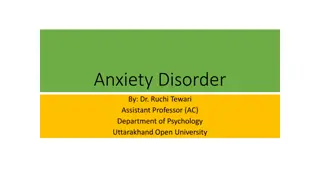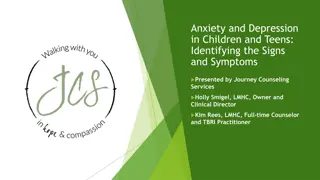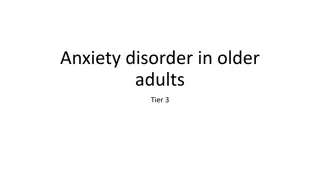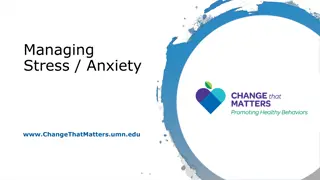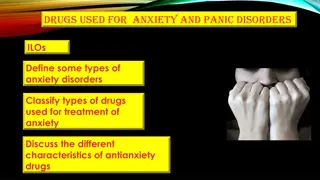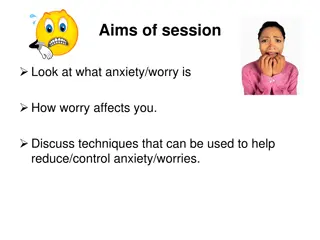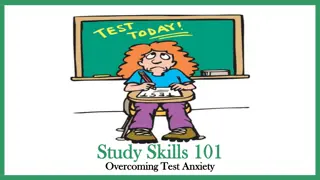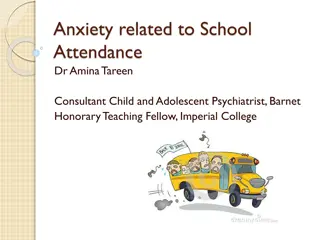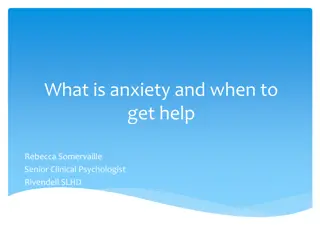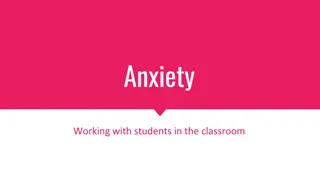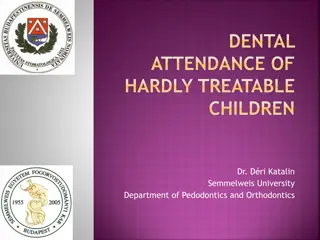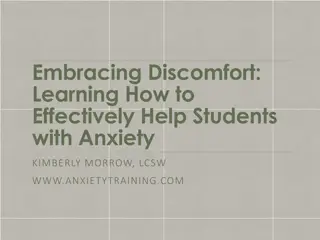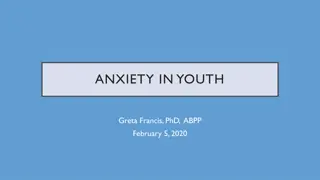Understanding Anxiety: Causes, Symptoms, and Treatment Options
Anxiety is a common mental illness that can manifest in various ways such as chronic nervousness, fear, and physical symptoms. It affects millions of adults in America and can worsen progressively without proper treatment. Factors like genetics, parenting, and societal issues can contribute to anxiety disorders. Psychotherapy, medication, and cognitive-behavioral therapies are common approaches to managing anxiety.
Uploaded on Nov 27, 2024 | 0 Views
Download Presentation

Please find below an Image/Link to download the presentation.
The content on the website is provided AS IS for your information and personal use only. It may not be sold, licensed, or shared on other websites without obtaining consent from the author. Download presentation by click this link. If you encounter any issues during the download, it is possible that the publisher has removed the file from their server.
E N D
Presentation Transcript
Age of Anxiety Tracy Inman tracy.inman@wku.edu NAGC Parent Representative
Present fears are less than horrible imaginings. Macbeth, Act I, Scene III
How does anxiety present itself?
WHAT IS WHAT IS IT? IT?
most common mental illness psychotherapy chronic, unremitting, and can grow progressively worse medication co-exist cognitive- behavioral therapies nervousness and fear physical symptoms excessive, irrational fear and dread 19 million adult Americans *Compiled from The Diagnostic and Statistical Manual of Mental Disorders: Fourth Edition-Text Revision published by the American Psychiatric Association (2000) and a number of sources in public domain, including information and data published by the National Institute of Mental Health. Ed Amend https://theamendgroup.com/resources/anxiety-facts/
WHY IS IT? WHY IS IT?
child temperament parental conflict bullying behavior acceptable? genetics inconsistent parenting discussion of adult matters parental anxiety parental disapproval/ criticism
child temperament parental conflict social injustice climate change bullying COVID-19 behavior acceptable? genetics inconsistent parenting discussion of adult matters parental anxiety parental disapproval/ criticism
NECESSARY NECESSARY ANXIETY ANXIETY
UNNECESSARY UNNECESSARY ANXIETY ANXIETY
Unique Sources of Anxiety in Gifted Dr. Sal Mendaglio Social coping, where gifted children feel different, leading to their experience of social rejection. Big-Fish-Little-Pond (BFLP) Effect, which refers to the deflated self-concept gifted children might feel when moving from a mixed ability to similar ability programming. Hitting the wall, the first encounter gifted children have that requires they put forth more effort than in the past.
Giftedness as Source of Anxiety Dr. Sal Mendaglio Heightened sensitivity, which indicates a greater awareness of the physical, social, and intrapersonal environments. Analytical attitude is a gifted individual s propensity to question, evaluate, and judge everything and everyone they encounter. Self-criticism may also be a source of anxiety.
WHAT SHOULD WHAT SHOULD A PARENT DO? A PARENT DO?
WHAT SHOULD WHAT SHOULD A PARENT DO? A PARENT DO? NOT
Misjudge outbursts or overreactions as a sign of bad behavior. Overreact in a trivial situation. Neglect the idea that parents or other adults may be the source of the anxiety. Problem-solve or reduce the expression of emotions. Add fuel to the fire. DON T DON T
Misjudge outbursts or overreactions as a sign of bad behavior. Overreact in a trivial situation. Neglect the idea that parents or other adults may be the source of the anxiety. Problem-solve or reduce the expression of emotions. Add fuel to the fire. DON T DON T
Misjudge outbursts or overreactions as a sign of bad behavior. Overreact in a trivial situation. Neglect the idea that parents or other adults may be the source of the anxiety. Problem-solve or reduce the expression of emotions. Add fuel to the fire. DON T DON T
Misjudge outbursts or overreactions as a sign of bad behavior. Overreact in a trivial situation. Neglect the idea that parents or other adults may be the source of the anxiety. Problem-solve or reduce the expression of emotions. Add fuel to the fire. DON T DON T
Misjudge outbursts or overreactions as a sign of bad behavior. Overreact in a trivial situation. Neglect the idea that parents or other adults may be the source of the anxiety. Problem-solve or reduce the expression of emotions. Add fuel to the fire. DON T DON T
Relaxation Advice and Techniques Sleep regularly Eat healthily Exercise or be active Avoid caffeine and sugar Talk with someone you trust Laugh Journal DO
What Can I Control? -Make a list of things weighing you down. -Review the list. Circle the things within your control. Mark through the rest. -Write two small, realistic steps to take to ease the stress of each thing. DO
Relaxation Advice and Techniques Sleep regularly Eat healthily Exercise or be active Avoid caffeine and sugar Talk with someone you trust Laugh Journal What s the worst that can happen? Can you deal with that? Relaxation techniques Yoga Progressive relaxation Aromatherapy Visualization MindfulnessDO
Mindful Breath NICOLE A. NICOLE A. TETREAULT TETREAULT, , PH.D. PH.D. DO
Learn as much as you can. DO
Parent TIP Sheets Free, Downloadable bit.ly/NAGC_TIP
Magazines and Books www.nagc.org
Free NewsSource Delivered to Your In Box www.nagc.org
Web and Social Media www.nagc.org NAGC - National Association for Gifted Children Twitter @nagcgifted
Recursos Para Los Padres de Familia Helping Your Gifted Child to Succeed http://www.nagc.org/resources-publications/resources-parents/recursos-para-los-padres-de- familia
Other Resources Online Supporting Emotional Needs of the Gifted (SENG) NAGC TIP Sheets Hoagies Gifted Davidson Institute The 2e Center for Research and Professional Development at Bridges Academy Print Misdiagnosis and Dual Diagnoses of Gifted Children and Adults, Perfectionism: A Practical Guide to Managing Never Good Enough, Living with Intensity The Social and Emotional Development of Gifted Children: What Do We Know? Understanding the Social and Emotional Lives of Gifted Students Success Strategies in Parenting Gifted Kids
A special thank you goes to Dr. Ed Amend Dr. Sal Mendaglio tracy.inman@wku.edu
